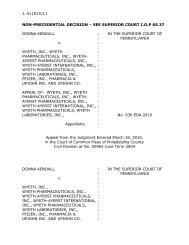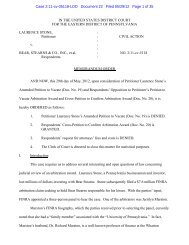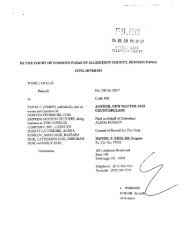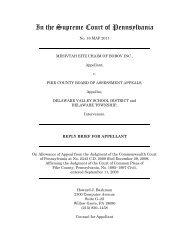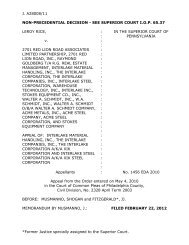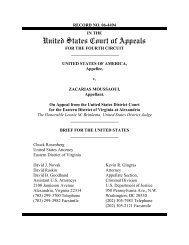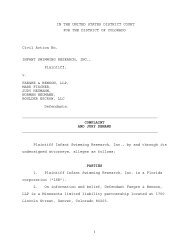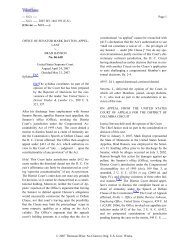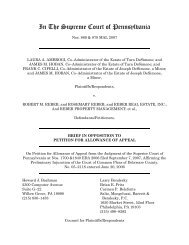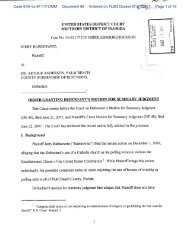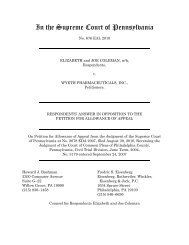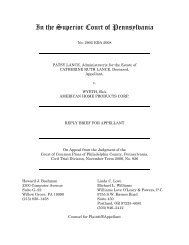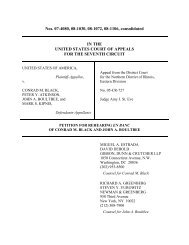DePinto v. Bayonne Board of Education
DePinto v. Bayonne Board of Education
DePinto v. Bayonne Board of Education
You also want an ePaper? Increase the reach of your titles
YUMPU automatically turns print PDFs into web optimized ePapers that Google loves.
Case 2:06-cv-05765-JAG-MCA Document 18 Filed 09/19/2007 Page 22 <strong>of</strong> 28<br />
Id. at 415.<br />
The Third Circuit, in reviewing the grant <strong>of</strong> summary judgment, outlined the<br />
Tinker–Fraser–Kuhlmeier framework. Id. at 416. The Circuit then reasoned that “any analysis<br />
<strong>of</strong> the students’ rights to expression on the one hand, and <strong>of</strong> the schools’ need to control behavior<br />
and foster an environment conducive to learning on the other, must necessarily take into account<br />
the age and maturity <strong>of</strong> the student.” Id. (citing Muller by Muller v. Jefferson Lighthouse Sch.,<br />
98 F.3d 1530, 1538 (7th Cir. 1996) (“Age is a critical factor in student speech cases . . . .”);<br />
Baxter by Baxter v. Vigo County Sch. Corp., 26 F.3d 728, 738 (7th Cir. 1994) (“[A]ge is a<br />
critical factor in assessing the extent <strong>of</strong> a student’s free speech rights in school.”). 10<br />
The Circuit acknowledged that Tinker applies, but reasoned that Tinker is flexible enough<br />
to accommodate the age <strong>of</strong> the children. Id. at 417. “Tinker provides a flexible standard” and in<br />
the case <strong>of</strong> elementary school children “requires that schools have a legitimate educational or<br />
disciplinary justification for regulating school expression.” Id. “In any event,” the Circuit<br />
continued, “if third graders enjoy rights under Tinker, those rights will necessarily be very<br />
limited[, i.e.,] [w]hen <strong>of</strong>ficials have a legitimate educational reason.” Id. at 417-18. Defendants<br />
argue for a different analysis for elementary school children under Tinker based on this language.<br />
10<br />
It is important to note that the Seventh Circuit opinions cited to in Walker-Serrano<br />
regarding the necessity <strong>of</strong> considering the age <strong>of</strong> the student in school free speech cases do not<br />
hold that Tinker and its progeny fail to apply to grade school children. Muller, 98 F.3d 1539<br />
(“[B]ecause the Supreme Court has not directly decided this question, the following analysis will<br />
assume that grade schoolers partake in certain <strong>of</strong> the speech rights set out in the Tinker line <strong>of</strong><br />
cases.”); Baxter, 26 F.3d at 738 (in holding that a school <strong>of</strong>ficial had qualified immunity because<br />
the First Amendment rights <strong>of</strong> a grade schooler was not “clearly established,” the Seventh Circuit<br />
stated that taking into account the age <strong>of</strong> the student “does not mean that elementary school<br />
students are entitled to no First Amendment protection.”). In fact, this Court has found no<br />
Circuit decision that alters, in its holding, the test provided by Tinker based on the age or grade<br />
level <strong>of</strong> the children involved.<br />
22



